FPH Stock Review: Is Today’s Price Worth The Buy?
President Duterte's commitment of the government to increase infrastructure spending and the move towards cleaner energy prompted me to look at First Philippine Holdings Corporation (FPH).
FPH is a 54-yr old diversified holding company with principal interests in the areas of energy, infrastructure, real estate and manufacturing.
Basic common sense tells me that YES, the government will have a significant impact on FPH.
But the real question I want to answer is; Is FPH the right company to invest in?
Let's take a good look into it.
Valuations
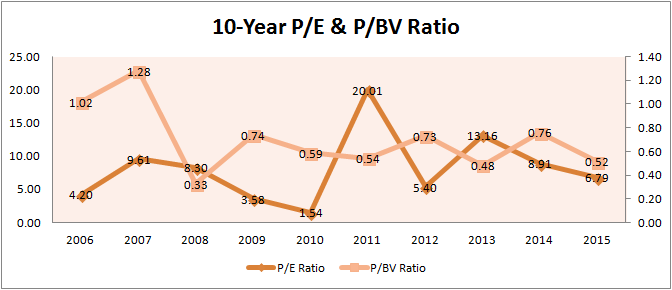
Fig. 1 P/E & P/BV Ratio
The stock looks undervalued but I want to know how the earnings performed for the last 10 years. Honestly, I was a bit disappointed how the earnings performed.
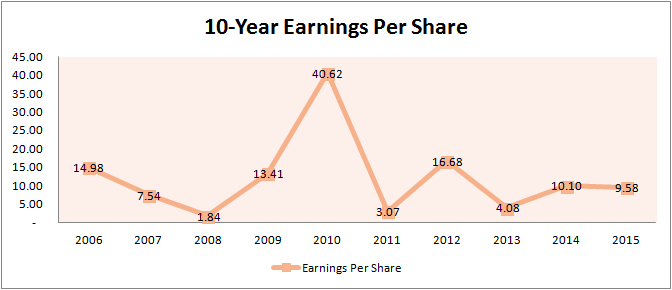
Fig. 2 !0-yr Earnings Per Share
The Net Margins are also disappointing. Just look at the years 2008, 2011 and 2013. The earnings are almost at break even point.
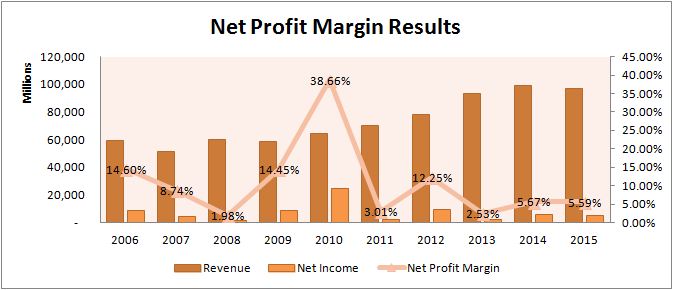
Fig. 3 Net Profit Margin Results
I like how the Revenue has increased consistently. But the Net Earnings isn't as consistent as the Revenue. The earnings are unpredictable that's what I can say. There’s a point where in 2010, EPS and Net Margins went up as high as 40.62 and 38.66% respectively then would drop at 3.07 and 3.01%. Now, I wonder why it is like that.
Further research indicates that the Net Income (attributable to equity holders of the Parent) in the above mentioned years decreased because of these reasons:
These losses are not directly connected with the company’s main operations but it greatly affects the bottom line. This makes the company’s earnings unpredictable to me.
I investigated their finance costs and found out that FPH carries a lot of debt.
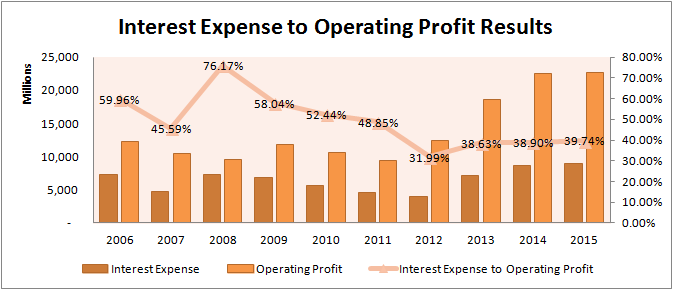
Fig. 4 Interest Expense to Operating Profit Results
Interest Expenses are historically high in the 10-year period. In 2008, FPH paid a large 76% of their Operating Profits to Interest Expenses (due to EDC acquisition). Last year, FPH paid 40% of their profits and these are caused by increase in their loan balances.
Debt to Equity is not healthy either.
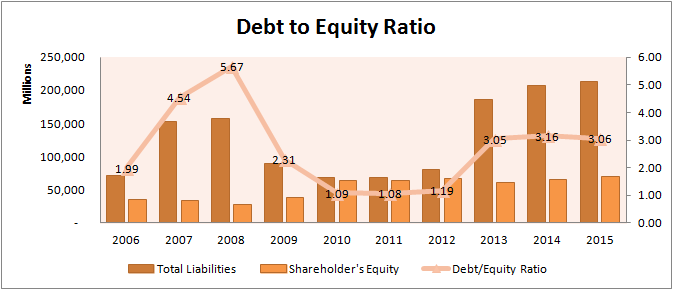
Fig. 5 Debt To Equity Ratio
Because of their high long-term debts, this makes FPH look like a not-so-ideal company to invest in.
Although the D/E ratio looks bad, the historical Current Ratios indicate that short-term liabilities are effectively managed.
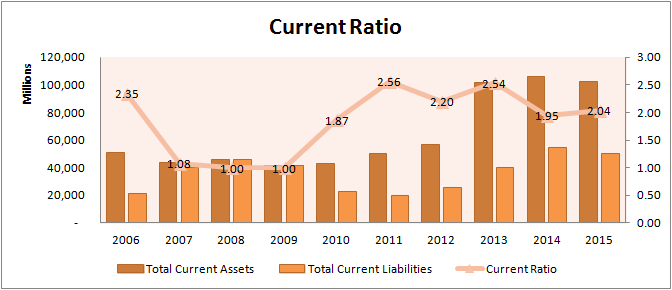
Fig. 6 Current Ratio
This is also evident when you look at their Cash. Cash is always greater than the amount of short-term debt for the given period except in 2007 and 2008.
In these years, FPH made major acquisitions and took on loans that resulted to a decrease in cash and increase in debt. These are:
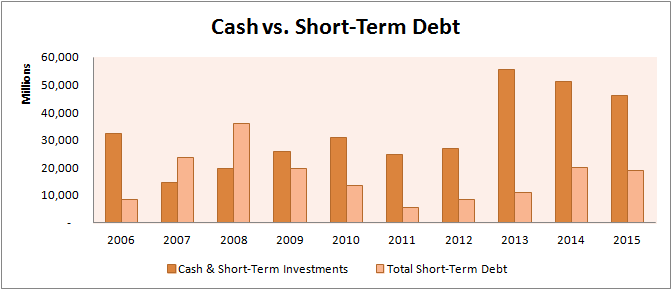
Fig. 6 Cash vs. Short-Term Debt
I looked at their debts in a different perspective and I saw that the Total Debts are higher compared to their Retained Earnings.
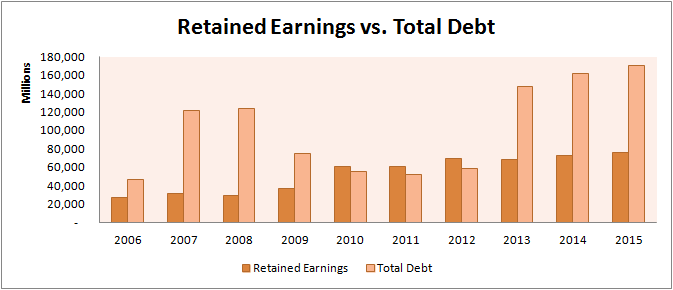
Fig. 8 Retained Earnings vs. Total Debt
The only exception is the years from 2010 up to 2012. All I can say is that FPH has a lot of debts and I don’t like it.
If you’ll ask me what I like about FPH, it’s the company’s Cash Flow.
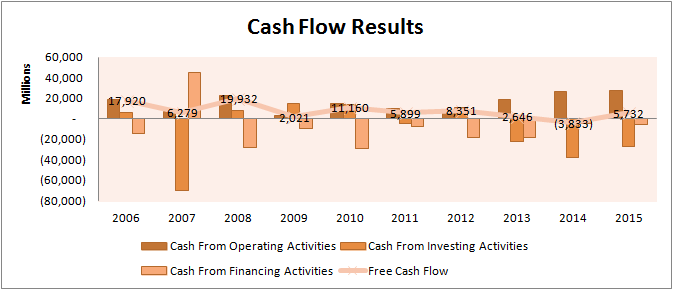
Fig. 9 Cash Flow Results
It is evident that they pay out their loans and their FCF has always been positive except in 2014 where Capital Expenditures amounted to ₱30.1 Billion versus Cash From Operating Activities amounting to ₱26.3 Billion. The way cash flows in the company is healthy. They always maintain a surplus of Cash.
Management Effectiveness
Here are the Historical RoE, RoA and RoIC.
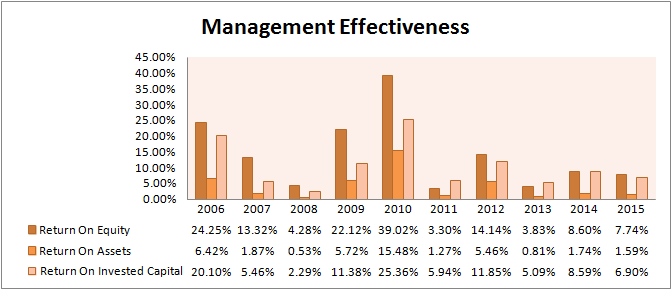
Fig. 10 Management Effectiveness
FPH showed an average10-yr RoE, RoA and RoIC of 14%, 4% and 10% respectively but if you’ll look at the last 3-yr average, the company performed poorly. You can also see the inconsistencies. There are periods when the returns are high and there are periods when it’s overly low which is not good in my opinion.
What I think About FPH
FPH is a good company to invest in if you want to bet in the energy and the infrastructure sector for the next 6 years of the Duterte administration.
Here's what I like about the company;
Here's what I don't like about FPH;
In my opinion, I think the best price to buy this stock today is at around ₱69.41/share. This is based on the 10-yr average Return on Equity of 14.06%. But if you’ll base it on the recent 3-yr average, this puts it at a valuation of ₱145.01/share which is almost the same as COL Financial’s fair value estimate of ₱140/share.
Today’s closing price is at ₱71.75/share which equates to a 13.70% rate of return. I recommend accumulating shares around these price benchmarks.
This concludes my FPH stock review. Do you think that FPH is a promising stock because of the bullish sentiment on infrastructure and energy sector? Do you think that FPH has a huge upside potential? I want to hear what you have to say.
Please don’t hesitate to leave your comments below.
Happy investing!

Great review and valuation Mark! I’m invested heavily on FPH mainly because they have been undervalued for so long. They have healthy cash flow and I also like their stake in EDC, Meralco, FPIP expansion and other First Balfour projects. Plus in line with the new administration’s projections I have acquired more shares. (hope it’s not a rookie mistake! haha!)
Like you, the things I don’t like about FPH is their debt and UNPREDICATBLE earnings. Why? Is it because of their acquisitions? Only a matter of time for a reversal? RoE, RoA and RoIC numbers are not healthy and inconsistent. Does this translate to poor management? For a Lopez Company?
I hope you share your thoughts so I can further lighten my position, Thank you as always!
Let me crunch some numbers here. 🙂
A company is attractive if it can sustain consistent earnings. Last year, FPH only made P0.05 for every P1.00 of Revenue. That is reflected into the Return On Equity which is only 7.74%. In a value investor’s point of view, why would you invest in a company that only gives you that amount of return when you can find a much higher return elsewhere?
Look at EDC. They recorded Net Margins of 22% and RoE of 16%. You can argue that it would be more profitable if you invested directly into EDC rather than FPH even though we know that FPH owns FGEN and FGEN owns EDC.
So what should be done? FPH should increase their Net Earnings by reducing cost of revenue, operational costs and sg&a expenses to increase their bottom line. This will also increase their RoE. The 5 centavo net earnings is just disappointing.
But this doesn’t mean that FPH is a bad company. Remember that it’s undervalued and you can easily profit from this if you have the patience to ride the ups and downs of this business. Look at the charts between the months of January and February 2016, you would see that it traded to almost P50/sh. If you invested heavily during these times, you would have huge gains by now. If you love the stock at P71.75/sh, then you should love it more at P50/sh.
As a basic rule which I follow, I find companies with Net Margins that exceed 20% and RoE of 10%. This should be consistent in long periods of time.
Hi Mark, thanks for the analysis. I was also interested and at the same time puzzled why FPH is consistently undervalued. As you explained, it’s because of the high debt and inconsistent income.
For the year 2016, FPH has reported an EPS of about Php17 which as of today the PER would be about 4.30. Dividend yield approximate 2.8%.
Considering the low PER, low PBV and the dividend yield based on the latest data, would FPH still be a “buy”? Although the RoE is quite low but should we also consider the market price which is about 0.50 PBV? So for investors who would be buying shares of FPH based on the current market price of about Php73, his/her respective own RoE should be higher than the FPH’s RoE? Example, if I buy FPH at 73, and the EPS is 17, my own rate of return would be 23% (17 divide by 73)?
Thanks in advance for sharing your thoughts.
Hi Ryu,
Do you happen to know where I can download the recent annual report for FY2016? I can’t seem to find it in PSE Edge and in FPH’s website. If you have a link, post it here and I’ll look into it and give my opinions about its valuations.
Hi Mark,
Kindly find below the link where I’ve found the annual report for FY2016. Thanks in advance for your insights.
http://edge.pse.com.ph/companyDisclosures/form.do?cmpy_id=197
I’ll look into this. 🙂
Text book rookie mistake. I guess I swayed from my set of criteria in choosing companies such as C/R must be above 1.50, D/E less than 0.50, ROE must be in double digits as well as ROIC. The numbers tell all the story as they say. I have managed to bring my average price into 68 over the past months. But hey, gain is gain. Haha! I believe my husband and I just have some fascination about FPH, that it had some sort of intangible or DCA. I have compared my notes from your review and found out the points I missed. I have lighten my position and took some profits this morning. Thank you once again Mark for sharing your knowledge! Drinks are on us when we meet you! Haha! Cheers 🙂
That’s great!
Numbers are just numbers. The important thing to know is the real story behind them.
You’re most welcome Alex! 🙂
I also wondering why FPH still undervalue for a long time? After reading your article, somewhat it gives me an answer. It’s because earnings not growing over those years. Nice to read your analysis sir, more power to you.
I’m glad it has given you a clearer insight. Thank you for the support. 🙂
Please also include your insight about PHN and PPC in your next blog. I think they are worth enough for your analysis sir. Thank you.
Hey dongskey thanks for the suggestions. I will.
Let me just say I am an engineer and inspired by your story on becoming an stock market investor. Great work and I find your blogs very useful. That’s why I got a copy your free e-book “The-Tiny-Book-on-Basic-Stock-Valuation-1.” Following your steps on Finding the Intrinsic Value of FPH, I came up with Future Value=984.18 and Intrinsic Value=611.10 (given EpS=2.96, %Margin of Safety=25% & %Discount=10%. Would you please validate this? Also, maybe you could share where you get your data to be used in the formula.
Hi Mr. Nakamura,
It’s good to know that my blog has helped you in a little way. It’s inspiring. 🙂
Now here’s the math;
I used EPS (TTM) = 10.93 (http://www.bloomberg.com/quote/FPH:PM)
P/E ratio varies. In my computation, I used 10.85 (average P/E for the last 5 years)
Growth is the 5-yr compounded annual growth rate at 32.87%, add in the 50% MoS, final growth at 16.43%. This is a more realistic growth rate because I don’t believe that a company can sustain a 33% YoY growth. The average index grows from 10% – 20%. You can use any values for growth. You can even guess it.
Calculating, I got FV = P253.73 (after 5 years)
Intrinsic value is P157.43
The best thing to do is to compare it to analyst estimates. COL’s estimate is at P140/share.
I hope this helps. 🙂
Thanks for the quickest reply. Where did you get the 5-yr CAGR?
I calculated it using eps from the 5-yr period (2011 and 2015).
Formula is: CAGR = [(recent eps / previous eps)^(1/4)] – 1
Many thanks! Now I know which stocks are still undervalued according to this method.
Great! Good luck in your investments sir. 🙂
Mark, thanks for the analysis.
It confirms my findings based on a quick look on the numbers.
I’m looking to invest in sustainable energy as well but have not made a decision yet on which one to buy. Still doing research..
All the best and keep it up!
Hi Mirek, thanks for your awesome feedback. 🙂
Good day,
Im a newbie in stocks trading, hope to hear more from you every time you have new article.
Regards
Hi Devinci,
Make sure to download my e-book so that you’ll get subscribed in my e-mail list. That way, you’ll get notified every week when a new post arrives.
Cheers!